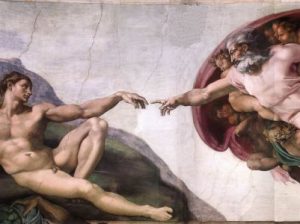Christian Anthropolo gy, the study of the human person, tells us that the nature of a human being is a composite of body and soul. But the human soul is also a spirit (breathed into us by God). We are like animals in that we have a body (but animals don’t have a spirit). We are like angels in that we have a spirit (but angels don’t have a body). The human body is associated with the “sensitive appetite” with faculties which are fed by the senses such as memory, imagination and, most notably, passions (feelings and emotions that incline us to act or not to act in regard to something felt or imaged to be good or evil.) The human spirit is associated with the “intellectual appetite” and its two faculties of intellect and will (Pope St. John Paul II highlighted as the source of man’s unique capacity for relationship with God):
gy, the study of the human person, tells us that the nature of a human being is a composite of body and soul. But the human soul is also a spirit (breathed into us by God). We are like animals in that we have a body (but animals don’t have a spirit). We are like angels in that we have a spirit (but angels don’t have a body). The human body is associated with the “sensitive appetite” with faculties which are fed by the senses such as memory, imagination and, most notably, passions (feelings and emotions that incline us to act or not to act in regard to something felt or imaged to be good or evil.) The human spirit is associated with the “intellectual appetite” and its two faculties of intellect and will (Pope St. John Paul II highlighted as the source of man’s unique capacity for relationship with God):
Intellect – the ability to know and understand. The action of the intellect is to know what is true (and God is the greatest truth). The intellect, in turn, engages lower mental functions such as memory and imagination.
Will – the governing faculty, by which we freely choose and act. The action of the will is to love goodness (and God is the greatest good). Note that, opposed to popular thinking, love is primarily a decision, not emotion.
The proper ordering and integration of intellect, will and passions is the purpose of Christian formation. In most situations our (properly formed) intellect should inform our will (so that we choose Holy things), and the intellect and will should master our passions. If we do this perfectly, we will be perfectly happy (which, for the Christian, is synonymous with Holy).
Because of the fall, our intellect is darkened (we don’t readily understand God’s truth), our will weakened (we don’t always choose the good and/or see our choices through) and our passions are disordered (we desire things that aren’t good for us, and we let our passions overrule our intellect and drive our choices).
But there’s always more; always mysteries to ponder in the Christian life. The definitions and concepts above are all abstractions – they don’t get to the very root of it. St. Theresa of Avila challenges that we know what our homes look like, but we don’t know what our own soul looks like. And, she muses at the distinction of the Soul and Spirit:
“As I was saying, it is possible to make observations concerning interior matters and in this way we know that there is some kind of difference, and a very definite one, between the soul and the spirit, although they are both one…. It seems to me, too, that the soul is a different thing from the faculties and that they are not all one and the same. There are so many and such subtle things in the interior life that it should be presumptuous for me to begin to expound them.”
So, what does your soul look like? How does God see you? What exactly does it mean that He resides in you? These are marvelous mysteries to study and bring to meditation.
Sources for further exploration
St. Teresa of Avila, Interior Castle
Taylor Marshall, Thomas Acquinas in 50 Pages
Peter Kreeft, Summa of the Summa
Frank Sheed, Map of Life
